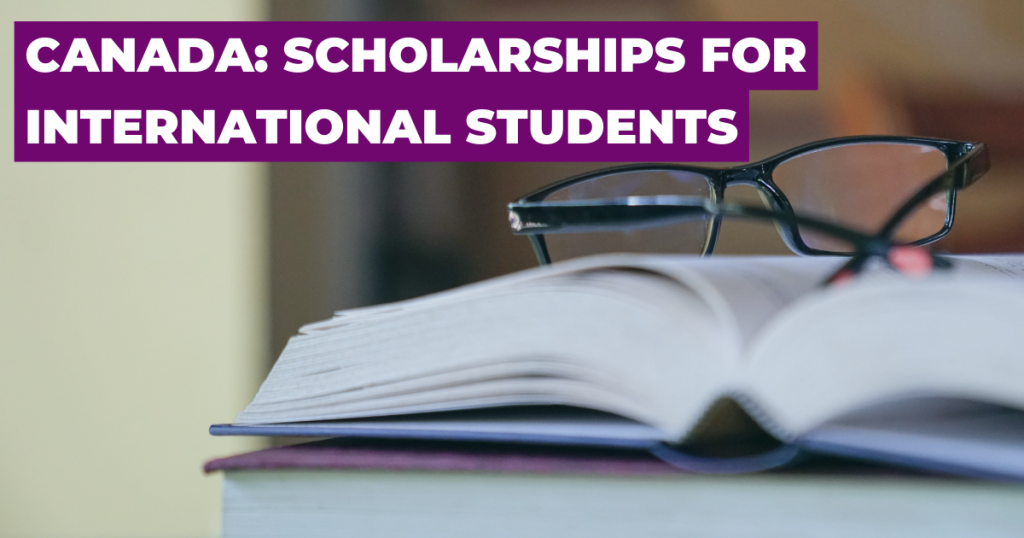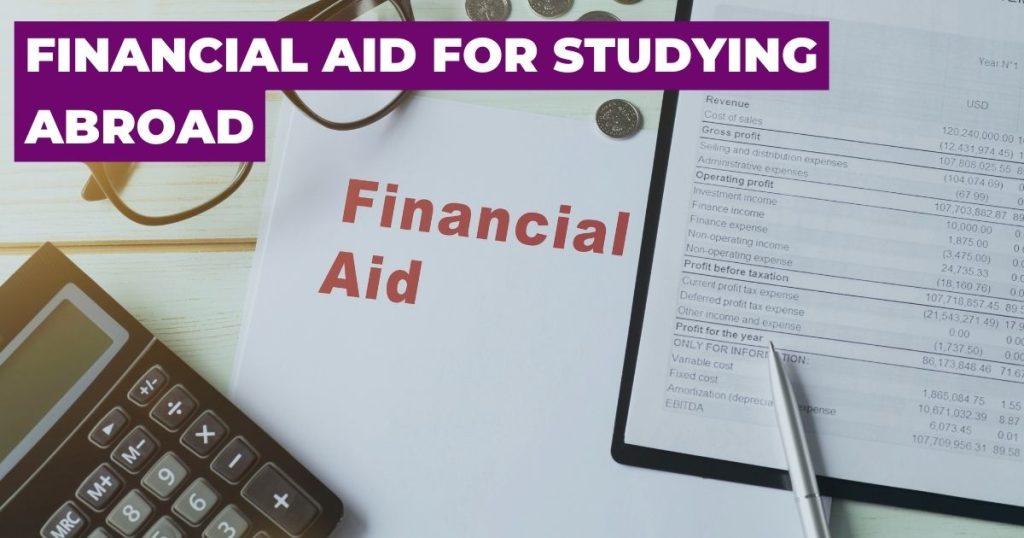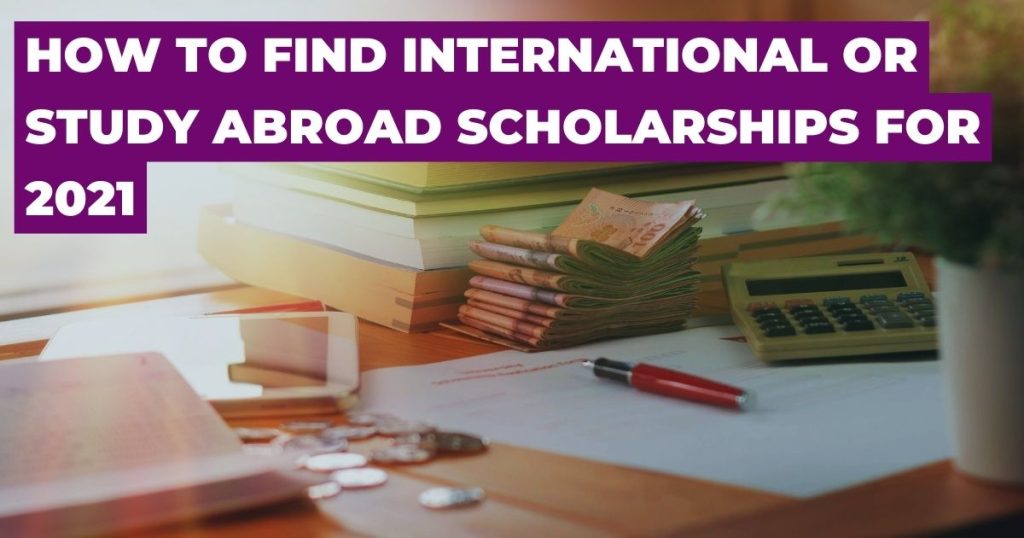
Due to high tuition fees in International colleges, students are unable to afford their studies. And when it comes to Canadian colleges and universities, the tuition fees for international students are one of the highest in the world.
However, if you qualify for a scholarship, your tuition fees would instantly decrease. And good news for international students, Canada has a lot of scholarship schemes to support students.
In this article, we are going to talk about the top scholarships that are available to international students who seek admission to Canadian colleges. So let’s look at Canada scholarship 2023 opportunities!

Scholarships are types of financial support/grants that students receive to study in Canada or study abroad in other countries. The number of scholarships for international students has been increasing over time as the number of students applying for admission every year is on the rise.
A lot of scholarship programs have been introduced by Canadian colleges and universities which make it easier for students to study in Canada. And the main motive behind these scholarship programs is to attract more and more international students towards post-secondary studies in Canada.
These scholarships help both local citizens and international students to pay their living costs, tuition fees, transportation costs, etc. These scholarships are mostly given to outstanding students who have the highest potential and exceptional academic achievement.
From a scholarship for Nepalese students in Canada to others for PhD degree courses, you can find a huge variety of opportunities.
Many well-known Canadian universities offer scholarships for studying abroad. Let’s look at some schools giving scholarship in Canada.
The University of British Columbia (UBC) offers a lot of scholarships for students interested in studying at the university. The university has a dedicated department that negotiates with various agencies and organizations to offer financial aid to deserving students from around the world.
Ryerson University is a public research university in Toronto, Ontario. The university offers a number of scholarships for students from various countries around the world.
Simon Fraser University is one of the well-known public universities in Canada that offer a number of scholarships to students every year. There are a total of 42 scholarship programs offered by SFU and one can get a scholarship in almost any field they wish to study.
The University of Victoria is one of the most well-known universities in Canada and it offers several scholarship programs for international students who seek admission to one of their campuses located across Canada. A total of 18 scholarships are offered through this university and one can apply in almost any field they want to study.
The University of Alberta is a public research university located in Edmonton, AB. The university offers scholarships for international students from around the world who wish to pursue undergraduate or graduate studies at their campus.
York University is a public research university located in Toronto, Ontario. The university offers many different scholarship programs for international students every year and one can find scholarships in almost any field they wish to study.
Cape Breton University is a public Canadian university that was established back in the late 1990s. It is located in Cape Breton Island and offers scholarships for international students who wish to pursue undergraduate, postgraduate, or doctoral studies at this university.
Canada Christian College has been the leading school for success in ministry since it was founded over 50 years ago. With a history that dates back to 1967, and an enrollment currently sit at 6500 graduates- including many leaders within these fields of work who have gone on to make significant impacts not only locally but globally as well! You may be eligible for Canada Christian College scholarships.

The University of Toronto is one of the world’s leading research institutions, and it is also a great place for international students. The university has a long tradition of welcoming students from around the world, and its diverse community is one of its biggest strengths. One of the reasons why the University of Toronto is such a great choice for international students is because of its excellent academic reputation. The university is home to some of the most respected scholars in the world, and its research facilities are second to none. In addition, the university offers a wide range of programs and courses, so there is something for everyone. Finally, the University of Toronto is located in one of the most vibrant and cosmopolitan cities in the world. Toronto is a multicultural city with something to offer everyone, and it is an ideal place to live and study. When you choose the University of Toronto, you are choosing an institution with a proven track record of success.
These are some of the major universities in Canada that offer a number of scholarship programs for international students every year. A lot of other Canadian colleges also offer scholarship programs for international students but many receive very few applications so the chances of getting these scholarships are very low.
Now let’s take a look at some of the most popular Canadian scholarships for international students.
There are a number of Canadian scholarship opportunities that offer full undergraduate scholarships for undergraduate programs every year. These degree level scholarships cover both tuition fees and living expenses and can be awarded to international undergraduate students every year.
The Pearson International Scholarship Program is offered by the Government of Canada in order to attract a number of the best and brightest students from around the world in various fields. The scholarship program awards up to 100 scholarships annually to internationally-trained students who wish to pursue undergraduate studies at any one of 39 participating universities across Canada.
This program is open to international students who have applied or are applying for an undergraduate program at York University. Eligible students can get $60,000-$100,000 in scholarship funding for the entire length of their undergraduate degree. It brings great opportunities for students from various countries to study in Canada for a very affordable tuition fee.
The scholarship offers a wide range of undergraduate scholarships for international students every year. International students who seek admission to one of the programs offered by this university can get full or partial funding for their tuition fees and living expenses.
This scholarship is awarded to international students who wish to pursue studies at Humber College. Selected candidates can get up to $4,000 per year for the first two years of their program that covers both tuition fees and living expenses.
The Winnipeg International Scholarship is offered by the Government of Canada to attract some of the best international students from around the world. Eligible students can get full scholarships for their tuition fees, living expenses, books, and other miscellaneous fees including airport transfers upon arrival in Canada.
Just like undergraduate students, Canada also offers numerous postgraduate scholarships for students who are looking to pursue graduate studies in Canada. The following are some of the most popular Canadian scholarships for international graduate students:
This scholarship program is awarded to doctoral students by the Government of Canada. The scholarship program awards up to $50,000 annually in order to attract some of the brightest minds from around the world for doctoral program/graduate studies at Canadian universities.
A number of scholarships are available to international students looking for doctoral studies at any one of the seven universities across Canada. The scholarship program covers tuition fees, living expenses, travel allowance, health insurance, and book allowance.
The fellowship program awards up to 10 scholarships each year to international graduate students who wish to pursue advanced studies at one of the four universities across Canada. Doctoral-level students can get up to $75,000 (backed by the Canadian Government) that covers tuition fees and living expenses for their entire period of study.
A number of scholarships are available to international students looking for graduate studies at the University of Waterloo. Selected candidates can get up to $2,000 as a fellowship award and $10,000 as a research grant that covers some part of their tuition fees and living expenses.
Under this scholarship, selected candidates can get up to $60,000 that covers everything for three years for their master’s degree. This scholarship is also given to candidates who are applying for PhD Scholarships in the social sciences and humanities. The Pierre Elliot Trudeau Foundation Doctoral Scholarships are open to foreign PhD students from the developing world.
The eligibility criteria generally differ according to each scholarship program. However, there are some common eligibility criteria that you need to meet in order to apply for international student scholarships. This includes:

1. You must hold a valid passport and student visa from your home country of origin or legal residency
2. You should have the required academic and language credentials for the scholarship program that you are applying for.
3. You should meet certain age and other eligibility criteria that may be specified by the scholarship program that you are applying for.
4. You must demonstrate your financial need in order to help support yourself while studying in Canada.
5. Most importantly you must have outstanding academic achievement.
The application procedure varies depending on the scholarship program that you are applying to. Usually, it includes:
1. Completing the scholarship application form
2. Writing an essay/research proposal
3. Attaching proof of your academic achievement, language skills, and employment experience
4. Submitting all required documents to the given authority
5. Participating in an interview or test if necessary for your application
6. Monitoring changes in government regulations and other scholarship program requirements
You can get details on how to apply for an international student scholarship by visiting the official website of the scholarship provider. However, the general process involves filling out a research abstract and submitting your application before deadlines set by each scholarship provider. Besides this, you are required to participate in an interview or written test if necessary.
Canada is one of the finest countries for higher studies. Not only is it a popular destination for international students from all over the world, but also attractive to candidates looking for scholarships and visitors in general. There are various scholarship programs available for international students to get admission in Canada and finance their education expenses. So make sure to do proper research and select the best scholarship program to apply for.
You might also be interested in studying in the U.S.
Are you searching for an engineering scholarship or a medical scholarship?

An adventure of a lifetime. A dream for many. A great opportunity to pursue your higher education in a foreign land – but is it affordable? Between tuition, insurance, travel and living expenses the cost of an international education quickly adds up.
If you’re thinking about studying abroad, it’s important to know your options for financial aid – and start saving!
One of the biggest factors in finding appropriate financial aid for a study abroad program is the location of the university you would like to attend. The availability of support for foreigners attending an American school is very different from that available to Americans pursuing an international education in Europe or elsewhere.
With that in mind, there is no simple answer to the best way to fund your study abroad adventure, but there are resources and opportunities for everyone, including undergraduate and graduate students.
From federal student aid to study abroad scholarships and from private sponsors, state organisations and your schools’s financial aid office – there is a financial aid package that will help you cover your study abroad expenses.
In this post we’re going to explore all the options and answer all the most common questions our readers have about securing financial aid for study abroad programs in the U.S., Canada and around the world. We’ll cover sections for Americans studying outside the U.S., international students coming to America, and those attending international schools around the world.

This is a topic that comes up all the time with our readers. Many students ask “Can you get FAFSA for study abroad?”.
First, let’s explain that FAFSA is the the Free Application for Federal Student Aid. This is a federal government form that determines your financial needs and informs most colleges’ financial aid offers. FAFSA collects information from applicants and parents, then uses a formula to calculate your capacity to pay for college in the United States and your financial aid requirements.
You won’t be able to receive any kind of federal financial aid in the US without completing the FAFSA, and it is very likely that you would need to complete it in order to receive financial aid directly from your college or university, too.
Federal aid is available for U.S. students seeking to study abroad. The type of program, duration of study and your status as an undergraduate or graduate can affect your eligibility, just like it does at schools in the U.S., but there are some differences when applying for this type of funding.
One of the biggest differences in the financial support for international studies is the duration of the intended study abroad program. At IEFA we generally talk about 2 main categories of international study: Study Abroad and Foreign Enrolled.

“Study Abroad” would be the term for those taking part in a short program of one semester or up to one academic year at a foreign university. Students on this type of program may be able to receive financial aid from the government if they fill out the FAFSA, meet the eligibility requirements and get the required paperwork completed by the financial aid office both at their home (U.S.) college and the foreign university they will attend.
Unfortunately, if your college is not part of the federal program then you would not be able to receive federal support for your study abroad costs.
A “Foreign Enrolled” student, on the other hand, is a U.S. citizen or permanent resident who is taking their degree program entirely at a foreign university. These students don’t have a “home institution” – a college in the U.S. They must therefore navigate the application process and study abroad experience themselves directly with their chosen school.
The good news for foreign enrolled students is that at many top universities around the world federal student aid is available and those same universities may have relationships with lenders who offer private loans for eligible students, too, meaning there are more funding opportunities and your study abroad dreams may be closer than you think.
If you are studying inside the U.S. or abroad, there are a number of different federal student loan programs and financial aid options. If you’d like more information on federal loans, you can learn about Stafford Loans here. Stafford loans are for students attending college at least half time. They provide an excellent educational funding resource for US citizens and permanent residents.
Funding options for international students in the U.S. are more limited than they may be in your home country.
In terms of the financial aid that you may be able to receive there are a few broad categories.

Whatever country you’re from, if you’re studying in Canada you’ll face the same challenges as many other students around the world.
The great news is that as well as the funding that you may be able to find by talking to your study abroad office such as tuition discounts, waivers, scholarships and more, there are also student loans available at a number of top universities across Canada. These loans do not require you to have collateral or a cosigner. Find out more about international student loans in Canada.
Do you have any questions about funding your study abroad experience? Let us know in the comments!
Yes, it can be stressful when you’re planning to study abroad. There are many perfectly understandable reasons to feel stressed or anxious. Tuition fees are high, you’ve got food costs, study materials, transportation, health insurance, and lots of other expenses.
Even the currency exchange rate can be a concern.
When you don’t have enough financial means you might consider taking out a student loan. Paying back the student loan can add another layer of stress. But still millions of students can be found at international colleges every year.
Students find ways to manage their financial situation and complete their education in international colleges.
Here are some budgeting tips for students who want to study abroad:
The tuition fees are probably the most expensive thing you will face when you plan to study abroad. The yearly cost can reach up to five figures and for some private colleges it can even reach up to six figures (USD). The Financial Aid Office or Admissions Office at your college of choice will have up to date information about their tuition fees.
But tuition is not the only cost to consider, living abroad involves other expenses like transportation, phone bills, health insurance, food expenses, holiday expenses, accommodation and more. When we talk about the cost of accommodation, most colleges provide (or at least offer) dorm rooms to their international students. But you can still choose to live off campus — alone or with a group of people. The rental cost for private accommodation will depend on the location you choose to live in.
It will be cheaper if you choose to live in a dorm. You can save money because you won’t have to pay for electricity, water, and internet bills as they will be included in the cost. You can also save money because you will be living on the college campus and therefore probably won’t have additional transportation costs.
Depending on your visa status you might be allowed to have a part-time job while studying. When allowed students can typically work for up to 20 hours a week during the semester and full-time during holidays and semester breaks. This could be a useful source of income to help you with your daily expenses.
Most international colleges have a dedicated advisory office for international students. They provide students the necessary advice so they can manage their experience — including their finances. They help students with budget plans, part-time job information, and other related information. It is a good idea to get their advice before making any decisions relating to your finances.
Although they might seem like a golden opportunity, remember that paying back your international student loans can cause stress and worry for some students. Getting an International student loan should usually be your last port of call for additional funds. We suggest you first look for financial aid and scholarships from schools and other sources. If you still find a financial gap after exhausting all the other sources, this is the time when international student loans come in handy.
If you focus on your education and keep an eye on your budget, you’ll be able to enjoy completing your education at an international college. Try to avoid unnecessary expenses and focus more on savings. Here are a few examples of how you can save money: Use a bicycle to avoid transportation costs, try to cook your food at home rather than eating in a restaurant, so you can avoid food costs. Most importantly take advice from school advisors, they can assist you with your budgeting.
At the same time, look for ways to make the most of your time as a foreign student, take part in activities and explore your home away from home while you can.

Who Provides Study Abroad Scholarships?
Scholarships can come from many different sources and you’re typically eligible to receive more than one form of financial support. Review the guidelines for each scholarship or award to see what opportunities you qualify for.
There are various sources of funding for the financial aid, such as:
Sponsoring institutions may be run or influenced by people who have studied abroad themselves and because of that they truly understand the value of experiencing an international education.
The availability of scholarships for international students will vary from country to country. Whichever scholarships you apply for, remember to be patient and persistent – as the application process and decision-making can take time. That being said, scholarships are an excellent way to help you finance your study abroad dreams.

What Can a Study Abroad Scholarship Cover?
Depending on which of the many scholarships you decide to apply for and who is sponsoring it, the terms of the scholarship, and what it can be used to pay for (and what it can’t be used for) can vary greatly.
Most scholarships are supposed to cover your basic cost of studying. This might include the cost of tuition, registration fees, books, and other school-related costs. With some scholarships, a portion of living costs may also be covered, such as the cost of food and accommodation (sometimes referred to as “room and board”.
Some international scholarships are much less strict. They will award you a sum of money which you can put towards your studies however you feel is appropriate depending on your circumstances. Of course that doesn’t mean you can just spend the money on whatever you like, it should all be used to fund your education – not for social activities or any other purpose. The difference is that you’re more in control of your own budget and can use the financial aid as you see fit.
It’s important to think about when the study abroad scholarship money will be released to you. Funds are most commonly paid out in a lump sum before the start of the fall semester, but in some cases, may be paid out in instalments over the course of the year. In the case of a study abroad scholarship that is paid out in instalments, in order to keep receiving the payments you may be required to maintain a certain level of academic merit.
Scholarships can be either paid to finance office of the school or to the student directly. Your school or the sponsoring organization will have their own procedures for when scholarship funds will be awarded. You should ask in advance so that you’re able to work out your budget effectively.
Scholarships for Undergraduate Students and Graduate Students
Whether you’re an undergraduate or graduate student, there may be different funding options for you, so remember to explore all the options.
How to Find Scholarships to Study Abroad in 2021
For huge numbers of students, the idea of studying abroad is incredibly exciting and interesting. They want to experience a different culture first-hand, work on their communication skills in a foreign language, or just explore the world as an international student.
Depending on the destination you choose and the type of program you enrol in, it can either be really expensive or could even save you money. But finding a study abroad scholarship to study abroad can reduce the overall cost, otherwise for some, the dream of studying at a school overseas may be out of reach.
To find scholarships to study abroad, first think about the destinations and courses that you are interested in. Contact the schools that you would like to attend to see what aid is available for international students, and use the IEFA.org scholarship search for the latest list of available scholarships.
Related Content
Studying in the United States vs. Canada
Financial Aid For International Students in the US: Explained
10 things you need to know about international student loans
Scholarships in medical fields
Deadline March 31st
The FISITA Travel Bursary is helping international students from around the world to pursue engineering through the automotive industry. Just to name a few examples, they have “enabled Korean students to work for General Motors in Michigan, USA, helped Australian students fund placements at Robert Bosch GmbH in Germany; supported Polish students studying at RMIT in Melbourne, Australia; helped students from India to carry out research at Automotive Institute of HAN University, The Netherlands and contributed funding for UK students to study at Manipal Institute of Technology in India.”
Numerous €2000 scholarships twice a year will be awarded through the FISITA Travel Bursary to help students with costs associated with international internships, exchange programs or work placements.
To be eligible for this scholarship you must meet the following requirements:
Individuals who apply for the FISITA Travel Bursary will want to ensure they review the checklist and terms and conditions, then complete the application form to be reviewed by the program judges.
FISITA is a non-profit organization dedicated to improving automotive transportation since being founded in 1948.
If you would like more information on this scholarship and how to apply you can visit here.
 Funding your education doesn’t have to be impossible if you don’t have the money on hand. There are thousands of scholarships out there designed for international students – you just need to know how to look and what you need to include to make your scholarship application standout. This Friday, May 23 at 11 am EST, our partner InternationalStudent.com will be putting on a live hangout on How to Find a Scholarship.
Funding your education doesn’t have to be impossible if you don’t have the money on hand. There are thousands of scholarships out there designed for international students – you just need to know how to look and what you need to include to make your scholarship application standout. This Friday, May 23 at 11 am EST, our partner InternationalStudent.com will be putting on a live hangout on How to Find a Scholarship.
Topics will include:
Scholarships are essentially financial awards that do not need to be paid back, and because of this, they can be competitive. Tune in this Friday to increase your odds of getting picked. Here’s how:
It’s that easy! At the end of the Hangout they will take any questions you have so make sure you have all of your questions ready. Hope to see you there!
 When it comes to finding an international scholarship, you’ll notice that there are a lot of options out there. You can find scholarships on merit or need. You can find scholarships based on where you are from or where you are going. You can find scholarships based on hobbies, the arts, sports, academics – the list goes on and on.
When it comes to finding an international scholarship, you’ll notice that there are a lot of options out there. You can find scholarships on merit or need. You can find scholarships based on where you are from or where you are going. You can find scholarships based on hobbies, the arts, sports, academics – the list goes on and on.
International scholarships are competitive, because many students are looking for ways to get funding that they don’t have to pay back. To stand out from the pool of applicants, we recommend focusing your efforts on applying to scholarships that are looking for someone just like you.
So how do we do that? The first step is to take an introspective look at yourself and find out what you like, what your good at, and what makes you – well – you!
Here are 8 questions to ask yourself to find an international scholarship:
Once you find out what makes you a unique candidate, then it is time to begin the hunt for scholarships. Use our scholarship search tool to find awards that matches your unique talents, skills, and interests. This also makes it much easier to apply for these awards because you’ve already demonstrated your passion whether it’s through previous awards or experiences.
Want to know about other tip and tricks for submitting a scholarship application? Check out our other relevant blogs to help you on your way!
 December is here! And before you head off for winter break, it’s important to also think about your finances. Set a few hours each day searching for awards and applying so that you’ll be in good shape in time for the new semester. Our Scholarship Search makes it easy to do, here’s how:
December is here! And before you head off for winter break, it’s important to also think about your finances. Set a few hours each day searching for awards and applying so that you’ll be in good shape in time for the new semester. Our Scholarship Search makes it easy to do, here’s how:
Not ready to apply? You can also bookmark the awards that you are interested in, and come back later to apply. Yes, it really is that simple!
Scholarships, grants, and fellowships are the perfect award as it is money given to you that is not required to pay back. Depending on the award, you may need to show that you need the money, or it may be based on merit.
If you still need additional help funding your education overseas, then an international student loan can cover the gap. Unlike scholarships, grants, and fellowships, loans require that you pay back the money with interest. Our Comparison Tool will allow you to select your school and citizenship, and find the available loans that will work for you.
Want more information on scholarships? Check out our scholarship blog posts.
 Phi Kappa Phi Study Abroad Grant
Phi Kappa Phi Study Abroad Grant
Deadline: April 1
Two Phi Kappa Phi study abroad grants have been created through the Phi Kappa Phi society to assist students that are interested in studying abroad with having the opportunity to do so. To be eligible to apply for this award, students must be enrolled at an institution with an active Phi Kappa Phi chapter, have a 3.5 or higher GPA (on a 4.0 scale), have earned between 56 and 90 semester hours and have already received acceptance into a study abroad program.
There are 50 Phi Kappa Phi study abroad grants in the amount of $1000 available. Two of these awards are endowed by donors:
Larry Sommers Study Abroad Grant: Former society president, Larry, was unable to study abroad during his time at the University of Wisconsin. Larry donates this grant to give other individuals the opportunity to pursue their dream of studying abroad.
McKenzie Study Abroad Grant: Former society president, Wendell H. McKenzie, Ph.D and his wife Georgie McKenzie provide one of the Phi Kappa Phi study abroad grants to be used by a student from North Carolina State University.
If you would like to receive a grant to study abroad and meet the eligibility criteria, you can find more information on the Phi Kappa Phi study abroad grant here.
Excited Woman Under a Money Rain photo courtesy of Shutterstock
Ralph W. Stone Graduate Fellowship
Deadline: March 15
National Speleological Society (NSS) members who are pursuing graduate studies anywhere in the world are able to apply for the Ralph W. Stone Graduate Fellowship award. This fellowship grant awards two winners annually in the amount of $2,000 to be used toward research.
This award is an unrestricted grant to assist graduate students with their speleological thesis research in the biological, social or earth sciences. The Ralph W. Stone graduate fellowship application is due March 15 and must include the following:
NSS is a non-profit organization that is dedicated to the study and protection of caves, karst and their natural content.
Interested applicants can find out more on the Ralph W. Stone graduate fellowship grant here.
